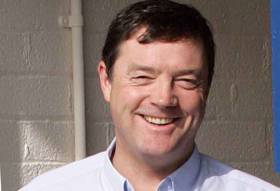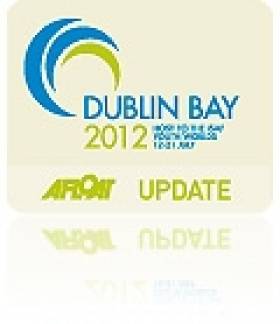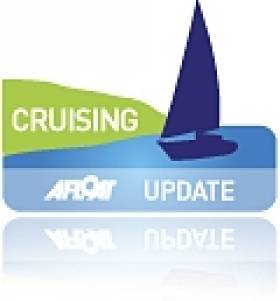Displaying items by tag: Paddy Boyd
Mackey to Head Canoeing Ireland High Performance Programme
#Canoeing: Jon Mackey is to head up high performance at Canoeing Ireland. Mackey, who works as training and development officer at Canoeing Ireland, is national coach for Kickboxing Ireland. In this role he guided the Ireland team to fourth place on the medals table at the junior World Championships in Jesolo in Italy in September. He is also studying for a Masters in coaching science in sport at UCD.
Mackey said he was looking forward to his new role and that Irish canoeing had some of its best results on the international stage this year. “We have a team with huge potential and I look forward to working along side them as we endeavour to make our mark on the European, world and Olympic stage.”
Paddy Boyd, the outgoing ceo of Canoeing Ireland, said the appointment addressed a need. “There is undoubted paddling talent in Ireland, borne out by recent results. It is incumbent on Canoeing Ireland to provide the support for our ambitious young athletes.”
#Canoeing: Paddy Boyd, who was previously the chief executive of the Irish Sailing Association, has been appointed as interim chief executive of Canoeing Ireland. The Dún Laoghaire man will run the organisation until a full-time chief executive is apppointed.
Boyd, who is a master mariner by profession, was chief executive of the ISA for 16 years until the end of 2004. Under the Dún Laoghaire man, the sport grew, and he was an important agent in the professionalisation of the association.
From 2009 to 2015 Boyd served as chief executive of Sail Canada.
Sport Ireland hopes that a new, full-time, ceo will be appointed in the medium term. “I’m here to help out for a few months,” Boyd said.
The previous chief executive of Canoeing Ireland was Karl Dunne.
Dublin Bay World Youth Championships to Boost Irish Sailing
When the ISAF World Youth Sailing Championships are hosted on Dublin Bay in 2012 the regatta should be representative of the best of Irish sailing, organisation and hospitality and ignite an immediate but lasting legacy for youth and the future of Olympic sailing in Ireland writes Andi Roberston.
It is nearly two years since the prestigious global annual championships were awarded to Ireland and the organisation of the event has now developed substantial momentum. Already a core group of around 50 volunteer officials are working on the delivery of the regatta which, with up to 450-500 sailors and coaches from as many as 60 different nations, in terms of size, logistics and delivery stands as one of ISAF's big three major multiclass events alongside the four yearly Olympic regatta, and the ISAF Sailing World Championships.
At the helm of the organisation is Brian Craig, a former flag officer of the Royal Saint George YC on Dublin Bay, who for ten years has been instrumental in attracting, developing and running major regattas on these expansive world class racing waters, including the huge success that has been Dun Laoghaire Week. In particular a recent success has been pooling the resources of the Bay's major clubs to attract and manage big events.
"I think we are really in pretty good shape. There is a big groundswell of enthusiasm and excitement and we are drawing on that to develop a really first class, memorable event." Craig comments.
An advisory group composed of renowned experts who have many years of experience of the event in particular is at the core of organisation just now, including Bill O'Hara, International Judge and Volvo Ocean race officer, Jim Saltonstall the British coach who has attended almost all of the ISAF/IYRU Youth World Championships and helped develop a galaxy of Youth Worlds and Olympic medallists, Ken Ryan – a former ISAF Vice President who has more than 25 years of experience with ISAF and major events and Paddy Boyd, formerly Irish Sailing CEO and now Director of Canadian sailing's national governing. body.
It was a visit to the Youth World Championships in 2008 which convinced Craig that after ten years of development of the Clubs and infrastructure on Dublin Bay, the time was right for them to step up and land a major world class event.
"Now we have plenty of support for the event. We have government backing, the three major clubs, the Royal St George, the National Yacht Club and the Royal Irish are all behind us, the waterfront organisations, the tourist boards and the town itself. The support is great." Craig explains.
A delegation were in Istanbul at the last ISAF Youth World Championships in 2010 and in Croatia this coming summer, as well as a team observing and learning, several members of the race teams will be hands-on on the race courses this getting first hand experience to ensure good continuity in to next year.
"We have a fantastic site. A massive 700-800 metres of frontage with the three clubs all within five minutes of each other. We will create a central sailing village feature which will have an immediate public access so that there will be maximum interaction with the public, but where the sailors can still preserve their essential privacy in competition mode. We intend to absolutely preserve the competitive integrity of the event, but to make sure it works for public access."
To create a regatta which emphasises the cosmopolitan, international flavour of the regatta, but which also fully ensure the competitors enjoy the full experience of Irish culture, race days will themed for the public around many of the key nations – so there will be a French, Australian, Spanish, Chinese days as well as the underlying Irish hospitality and craic.
And while it is inevitable that only a few Irish sailors will compete at the ISAF World Championships on their home waters, in the interim period a ISAF Youth World Championships Road Show will visit Irish Sailing Clubs to stimulate interest and awareness of the event.
"We are determined that hosting the ISAF Youth World Championships will produce a lasting legacy for Irish sailing, perhaps seeding the future for Irish Youth Worlds or even Olympic medals. And at the same time we are determined to deliver a memorable, top class event with a distinctly Irish flavour." Concludes Craig.
The 2012 ISAF Youth World Championships are scheduled for the period 12th -21st July 2012. Around 350 sailors and 100 coaches from about 60 nations are expected to attend, composing a fleet of 250 boats. The race programme will last ten days. Classes will be the Laser Radial Boys and Laser Radial Girls, 420 Boys and 420 Girls, RS:X Boys and RS:X Girls. 29er Open Skiff, and the Open Formula 16 Catamaran. Boats or boards are supplied by Laser, Nautivela, Neil Pryde, Ovington and Serena.
In recent years Dublin Bay has hosted the Topper World Championships, the Star European Championships, the 500 boat Dun Laoghaire Regatta, the Laser 4.7 Europeans, Dragon World Championships, the Etchells World Championships (Howth), the SB3 World Championships, the 470 European Championships, the Flying 15 World Championships and the 420 Junior World Championships.
Cruising School No Longer Operating in Irish Waters
South East Cruising School is no longer operating in Irish waters and in a letter to Afloat magazine, Principal Charlie Kavanagh, outlined his reasons for closure. The letter is reproduced below. The Marine Survey Office (MSO) was offered a right of reply but to date we have had no response.
Sir,
Having operated my business, South East Cruising School, under the auspices of the Irish Sailing Association for the last 14 years, I am very sorry to say that due to adverse circumstances, I now find that I can no longer operate in Irish waters.
In that time, I have assisted well over a 1,000 sailors to learn about our sport and improve their skills in a safe environment. I would like to take this opportunity to say thanks to each and every one for their custom and friendship over the years.
I recently submitted my boat for inspection under the Commercial Sail Passenger Boat Regulations and the Marine Survey Office (MSO) conducted an initial survey last May, which has completely stalled over a number of issues. As it is my opinion that these matters will not be resolved amicably, I have no choice but to suspend things for now and look at other options.
For those of you not familiar with the process, the Department of Transport's MSO has drawn up a set of Regulations that, in my opinion, do not help to promote safer sail training.
They have refused point blank to consider adopting the UK's MCA Code of Practice, administered by the RYA, the world leaders in most matters relating to sail training and from whom I hold my Yachtmaster Instructor qualification.
Five years ago, we had close to 15 schools offering cruiser sail training, but this is now down to five or six, and it's unlikely any more will get through this process without severe cost to themselves and the security of their boat(s).
Also, to the best of my knowledge, we have no powerboat school for those wishing to learn big boat power handling. Not content with banishing Asgard II to remain in her watery grave, cruiser sail training in Ireland is fast being sunk by the State too, as it reduces the number of outlets that teach safe practices to the general public wishing to go to sea in our island nation.
In 1997, I set out to operate my school under the watchful eye of Paddy Boyd of the ISA and subsequently Tony Wright, both of whom worked hard to aid and supervise us under the ISA Cruising Scheme. My thanks go to them and all in the ISA for their help over the years. It is with a heavy heart that I have to let go of my dream, having suffered the highs and lows over the years, but 2010 has been a nightmare, thanks to the MSO.
As an Irish taxpayer and committed community person, I - like many others in the commercial marine community - am disgusted at the State's attitude towards sailing and the sea.
Yours in Sailing,
Charlie Kavanagh,
ISA/RYA Yachtmaster Instructor

































































